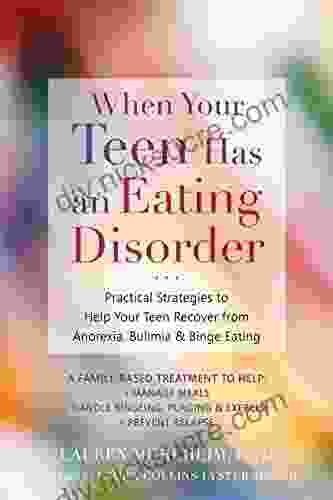When Your Teen Has an Eating Disorder: A Comprehensive Guide for Parents

4.6 out of 5
| Language | : | English |
| File size | : | 1830 KB |
| Text-to-Speech | : | Enabled |
| Screen Reader | : | Supported |
| Enhanced typesetting | : | Enabled |
| Word Wise | : | Enabled |
| Print length | : | 186 pages |
Eating disorders are serious mental health conditions that can have devastating consequences for teens. Anorexia nervosa, bulimia nervosa, and binge-eating disorder are the most common types of eating disorders, and they are characterized by extreme dieting, purging, and bingeing. These behaviors can lead to a variety of health problems, including malnutrition, heart problems, and even death.
Teens are particularly vulnerable to eating disorders because they are at a time in their lives when they are struggling with their identity and body image. They may also be under a lot of pressure from peers, school, and family to be thin and successful. As a parent, it is important to be aware of the warning signs of an eating disorder and to know how to support your teen if they are struggling.
What Are the Warning Signs of an Eating Disorder?
The warning signs of an eating disorder can vary depending on the type of disorder. However, some general warning signs include:
- Extreme dieting or restricting food intake
- Purging behaviors, such as vomiting, laxative use, or excessive exercise
- Binge-eating episodes, which are characterized by eating large amounts of food in a short period of time
- Changes in weight or body shape
- Amenorrhea, or the absence of menstruation
- Fatigue or weakness
- Difficulty concentrating
- Mood swings or irritability
- Preoccupation with food or weight
If you are concerned that your teen may have an eating disorder, it is important to talk to them about it. Be supportive and non-judgmental, and let them know that you are there for them. You can also encourage them to seek professional help.
What Are the Different Types of Eating Disorders?
There are three main types of eating disorders: anorexia nervosa, bulimia nervosa, and binge-eating disorder.
- Anorexia nervosa is characterized by an intense fear of gaining weight, a distorted body image, and severe food restriction. People with anorexia may also engage in purging behaviors, such as vomiting or laxative use.
- Bulimia nervosa is characterized by binge-eating episodes, followed by purging behaviors. People with bulimia may also restrict their food intake or diet excessively.
- Binge-eating disorder is characterized by binge-eating episodes, without the purging behaviors that are associated with bulimia. People with binge-eating disorder may feel out of control during their binge episodes and may eat until they are uncomfortably full.
What Causes Eating Disorders?
The exact cause of eating disorders is unknown, but a number of factors are thought to contribute, including genetics, personality traits, and environmental factors. Some people may be more genetically predisposed to developing an eating disorder, while others may be at higher risk due to their personality traits or life experiences.
Environmental factors that can contribute to the development of an eating disorder include exposure to thin ideals in the media, pressure from peers or family to be thin, and a history of abuse or trauma.
What Are the Treatment Options for Eating Disorders?
Treatment for eating disorders typically involves a combination of therapy, medication, and nutritional counseling. Therapy can help people with eating disorders to develop a more positive body image, learn healthy eating habits, and address the underlying issues that may be contributing to their disorder.
Medication can also be helpful in treating eating disorders, especially if the person is experiencing depression or anxiety. Nutritional counseling can help people with eating disorders to create a healthy meal plan and learn how to meet their nutritional needs.
How Can I Support My Teen if They Have an Eating Disorder?
If your teen has an eating disorder, it is important to be supportive and understanding. Avoid being judgmental or critical, and let them know that you are there for them. You can also encourage them to seek professional help.
Here are some tips for supporting your teen if they have an eating disorder:
- Be supportive and understanding.
- Avoid being judgmental or critical.
- Let your teen know that you are there for them.
- Encourage them to seek professional help.
- Be patient.
- Educate yourself about eating disorders.
- Take care of yourself.
Eating disorders are serious mental health conditions that can have devastating consequences for teens. However, with early diagnosis and treatment, most people with eating disorders can recover and live full and happy lives.
If you are concerned that your teen may have an eating disorder, it is important to talk to them about it. Be supportive and non-judgmental, and let them know that you are there for them. You can also encourage them to seek professional help.
4.6 out of 5
| Language | : | English |
| File size | : | 1830 KB |
| Text-to-Speech | : | Enabled |
| Screen Reader | : | Supported |
| Enhanced typesetting | : | Enabled |
| Word Wise | : | Enabled |
| Print length | : | 186 pages |
Do you want to contribute by writing guest posts on this blog?
Please contact us and send us a resume of previous articles that you have written.
 Fiction
Fiction Non Fiction
Non Fiction Romance
Romance Mystery
Mystery Thriller
Thriller SciFi
SciFi Fantasy
Fantasy Horror
Horror Biography
Biography Selfhelp
Selfhelp Business
Business History
History Classics
Classics Poetry
Poetry Childrens
Childrens Young Adult
Young Adult Educational
Educational Cooking
Cooking Travel
Travel Lifestyle
Lifestyle Spirituality
Spirituality Health
Health Fitness
Fitness Technology
Technology Science
Science Arts
Arts Crafts
Crafts DIY
DIY Gardening
Gardening Petcare
Petcare Thomas R Martin
Thomas R Martin Paul Mccarthy
Paul Mccarthy Certsquad Professional Trainers
Certsquad Professional Trainers Peter Nichols
Peter Nichols Peter Zheutlin
Peter Zheutlin Tanya Selvaratnam
Tanya Selvaratnam Rafe Esquith
Rafe Esquith Vernon Trafford
Vernon Trafford Kelly Starrett
Kelly Starrett Fernanda Pirie
Fernanda Pirie Zander Brumbaugh
Zander Brumbaugh Ed Webster
Ed Webster Flo Perry
Flo Perry Charles Szypszak
Charles Szypszak David J Vanbergen Jr
David J Vanbergen Jr Upton Sinclair
Upton Sinclair Mrjamvad
Mrjamvad Bruce Collier
Bruce Collier John L Parker Jr
John L Parker Jr A H Almaas
A H Almaas Susan Striker
Susan Striker A J Stewart
A J Stewart David Remnick
David Remnick Tsao Lin E Moy L Ac Msom
Tsao Lin E Moy L Ac Msom Val Mcdermid
Val Mcdermid Eileen Tracy
Eileen Tracy Ilya Ru
Ilya Ru A J Mackinnon
A J Mackinnon Charles Edward Chapel
Charles Edward Chapel Dr Howard Rankin
Dr Howard Rankin Marks Prep
Marks Prep David Spiegelhalter
David Spiegelhalter Lillian Tibbles Phd
Lillian Tibbles Phd Caspar Craven
Caspar Craven Jennifer L Armentrout
Jennifer L Armentrout Lauren Oliver
Lauren Oliver Anna Goldsworthy
Anna Goldsworthy Joe Pepitone
Joe Pepitone Seth M Holmes
Seth M Holmes William Monk
William Monk Dane Huckelbridge
Dane Huckelbridge Angela Himsel
Angela Himsel Susanne Foitzik
Susanne Foitzik Gabrielle Coleman
Gabrielle Coleman Monte Burke
Monte Burke K A Riley
K A Riley Marc S Sabatine
Marc S Sabatine Crystal Cestari
Crystal Cestari William Ramsey
William Ramsey Karla Helbert
Karla Helbert Shanterra Mcbride
Shanterra Mcbride A K Davidson
A K Davidson William C Oakes
William C Oakes Mark Ryan
Mark Ryan Eugene Don
Eugene Don John L Messina
John L Messina Gemma Milne
Gemma Milne Andrew Henderson
Andrew Henderson Lilin Yang
Lilin Yang Hicham And Mohamed Ibnalkadi
Hicham And Mohamed Ibnalkadi William Scott Wilson
William Scott Wilson Stephen R Lawhead
Stephen R Lawhead Cynthia Ulrich Tobias
Cynthia Ulrich Tobias Alexander Greenmaj
Alexander Greenmaj Russell Davis
Russell Davis Zen Lylah
Zen Lylah Lindsey Lapointe
Lindsey Lapointe Ken Castor
Ken Castor Steven Raichlen
Steven Raichlen Virginia Willis
Virginia Willis Corina Morariu
Corina Morariu Jonathan Eig
Jonathan Eig Shenyang Guo
Shenyang Guo Linda Tuhiwai Smith
Linda Tuhiwai Smith Sonya Chappell
Sonya Chappell A M Strickland
A M Strickland Helen Marot
Helen Marot Mj Porter
Mj Porter Jeff Kane
Jeff Kane Catherine Stonehouse
Catherine Stonehouse Saxton Pope
Saxton Pope Jec Aristotle Ballou
Jec Aristotle Ballou Pintip Dunn
Pintip Dunn Peter Rees
Peter Rees Gary Gruber
Gary Gruber Sarah Sutton
Sarah Sutton Meghan Leahy
Meghan Leahy Andreas Quast
Andreas Quast Roxanne Martin
Roxanne Martin Jim Vernes
Jim Vernes Amanda Ostrander
Amanda Ostrander A Roger Ekirch
A Roger Ekirch Alison Cotter
Alison Cotter John Mordechai Gottman
John Mordechai Gottman Din Daniels
Din Daniels Walter Dean Myers
Walter Dean Myers Kenay Keira
Kenay Keira Joe Navarro
Joe Navarro Dmv Test Bank
Dmv Test Bank Valerio Varesi
Valerio Varesi Kenneth Cline
Kenneth Cline Nick Jackson
Nick Jackson Lyla Lee
Lyla Lee Oba Ilari Aladokun
Oba Ilari Aladokun Elisabeth Fassas
Elisabeth Fassas Rekha Ramcharan
Rekha Ramcharan A J Carlisle
A J Carlisle A G Howard
A G Howard Cristian Salcescu
Cristian Salcescu Freya Hoffmeister
Freya Hoffmeister Niall Ferguson
Niall Ferguson Ryan Gray
Ryan Gray John Halligan
John Halligan Watt Key
Watt Key Lisa Pease
Lisa Pease Matt Brown
Matt Brown David H Barlow
David H Barlow Thomas C Tabor
Thomas C Tabor Raymond J Carroll
Raymond J Carroll Dr Kevin Leman
Dr Kevin Leman Amos Yong
Amos Yong Steve Hindman
Steve Hindman Matthew J Friedman
Matthew J Friedman Vitaly Pedchenko
Vitaly Pedchenko Nancy Mckenzie
Nancy Mckenzie Leslie Stager
Leslie Stager Manoush Zomorodi
Manoush Zomorodi Sandra Swenson
Sandra Swenson Don Fink
Don Fink Kathlyn Gay
Kathlyn Gay Iasha King
Iasha King Michael Lardon
Michael Lardon Diane Burke Fessler
Diane Burke Fessler Sky Marsen
Sky Marsen Rebecca Black
Rebecca Black Peter Maas
Peter Maas Jan Morris
Jan Morris Dame Darcy
Dame Darcy A J Hamler
A J Hamler Bill Jones
Bill Jones Leandro Taub
Leandro Taub David A Wells
David A Wells Remy Agee
Remy Agee Todd Downs
Todd Downs Harry Yoon
Harry Yoon Hazel Holmes
Hazel Holmes Dale P Clemens
Dale P Clemens Charles Butler
Charles Butler Sandra Niche
Sandra Niche Soap2day Publication
Soap2day Publication John Williams
John Williams Heather Anderson
Heather Anderson The R A
The R A Matthieu Ricard
Matthieu Ricard Kenneth Cloke
Kenneth Cloke Marlynn Jayme Schotland
Marlynn Jayme Schotland David Deutsch
David Deutsch Philip Golding
Philip Golding Peter Shelton
Peter Shelton Larit Levy
Larit Levy Tiara R Brown
Tiara R Brown Jennifer Trainer Thompson
Jennifer Trainer Thompson Sherrilyn Kenyon
Sherrilyn Kenyon Abigail Burd Lcsw Pmh C
Abigail Burd Lcsw Pmh C A G Cairns Smith
A G Cairns Smith A R Vasishtha
A R Vasishtha E S Wynn
E S Wynn A L Graziadei
A L Graziadei Michael D Coogan
Michael D Coogan Randy Friedman
Randy Friedman Jonalu Johnstone
Jonalu Johnstone A M Wilson
A M Wilson Richard Heath
Richard Heath Mike Branon
Mike Branon Georgia Varozza
Georgia Varozza Rick Telander
Rick Telander Armin A Brott
Armin A Brott Cathy A Malchiodi
Cathy A Malchiodi Bob Frye
Bob Frye Frost Kay
Frost Kay Dean R Johnson
Dean R Johnson John D Currid
John D Currid Brad K Chambers
Brad K Chambers Byron Pitts
Byron Pitts Jean Philippe Dionne
Jean Philippe Dionne Robert P Harris
Robert P Harris Scott A Ostrow
Scott A Ostrow Helen Buckley
Helen Buckley Jane Austen
Jane Austen Mia Kankimaki
Mia Kankimaki Rebecca A Moyes
Rebecca A Moyes Winston Starr
Winston Starr Michael Lanza
Michael Lanza Sean Skahan
Sean Skahan Stan Tenen
Stan Tenen Micha Gorelick
Micha Gorelick Emily Evans
Emily Evans Michelle Maccarthy
Michelle Maccarthy Patrick Meechan
Patrick Meechan Alf Wilkinson
Alf Wilkinson Sam Warburton
Sam Warburton Catherine Rodgers
Catherine Rodgers W Timothy Gallwey
W Timothy Gallwey Bruce Tremper
Bruce Tremper Susan Aud Sonders
Susan Aud Sonders Sherine Hamdy
Sherine Hamdy Daniel S Pierce
Daniel S Pierce Todd Rose
Todd Rose A J Angulo
A J Angulo Boston T Party
Boston T Party Rebecca Pelky
Rebecca Pelky Francis Fukuyama
Francis Fukuyama William Minto
William Minto Andrea Falk
Andrea Falk Dan Romanchik Kb6nu
Dan Romanchik Kb6nu Businessnews Publishing
Businessnews Publishing Ray Ordorica
Ray Ordorica Katerina Griffith
Katerina Griffith Thomas Mcguane
Thomas Mcguane Bear Heart
Bear Heart Ken Dryden
Ken Dryden Glenn Patron
Glenn Patron Jennifer Senior
Jennifer Senior Dale Dougherty
Dale Dougherty Kevin Adams
Kevin Adams Giordano Scalzo
Giordano Scalzo Adrian Dater
Adrian Dater Raymonde Carroll
Raymonde Carroll David Magee
David Magee Jon Gillespie Brown
Jon Gillespie Brown Kathy Koch
Kathy Koch Toni Natalie
Toni Natalie John Almberg
John Almberg Judi Garman
Judi Garman Josh Skeen
Josh Skeen Tammara Webber
Tammara Webber Tim Flanagan
Tim Flanagan Tony Wright
Tony Wright Lisa Murphy
Lisa Murphy Chris I Naylor
Chris I Naylor Lyndall Clipstone
Lyndall Clipstone Leigh Newman
Leigh Newman Shelly Mazzanoble
Shelly Mazzanoble Alyssa Padgett
Alyssa Padgett Roy Richard Grinker
Roy Richard Grinker Rina Kent
Rina Kent Arlin Smith
Arlin Smith Bob Plager
Bob Plager Tripp Bowden
Tripp Bowden Michael Labossiere
Michael Labossiere Rosie Garthwaite
Rosie Garthwaite Eva Mauer
Eva Mauer Rysa Walker
Rysa Walker Katrina Abbott
Katrina Abbott Stan Skinner
Stan Skinner Eric Armstrong
Eric Armstrong A J Messenger
A J Messenger Karl Knopf
Karl Knopf Barbara J Bain
Barbara J Bain Chris Diamond
Chris Diamond Jack Grimshaw
Jack Grimshaw Homeira Qaderi
Homeira Qaderi Sadie Robertson Huff
Sadie Robertson Huff John Brenkus
John Brenkus Grady Hendrix
Grady Hendrix A F Stewart
A F Stewart Anne Deans
Anne Deans Dr Stephanie Bloodworth Psyd
Dr Stephanie Bloodworth Psyd Cailin O Connor
Cailin O Connor Polly Moore
Polly Moore William F Mann
William F Mann Linh Phung
Linh Phung Rachael Allen
Rachael Allen Tom Jordan
Tom Jordan Christiane Kutik
Christiane Kutik Ken Alder
Ken Alder Filippo Coarelli
Filippo Coarelli George Francis Dow
George Francis Dow Lauren Muhlheim
Lauren Muhlheim Natalie Pompilio
Natalie Pompilio Jonathan S Rose
Jonathan S Rose Helen E Johnson
Helen E Johnson Pardha S Pyla
Pardha S Pyla James Baldwin
James Baldwin Joshua Akin
Joshua Akin Joel David Hamkins
Joel David Hamkins Christine Wheeler
Christine Wheeler Day Leitao
Day Leitao Jm Mason
Jm Mason Dawn Huebner
Dawn Huebner Laura Pohl
Laura Pohl Paul Watzlawick
Paul Watzlawick Kenn Bivins
Kenn Bivins John Long
John Long Jonathan Mckee
Jonathan Mckee Dan Limbaugh
Dan Limbaugh Chuck Whelon
Chuck Whelon Cath Smith
Cath Smith Harrison Fluss
Harrison Fluss Pete Ripmaster
Pete Ripmaster Mark Obmascik
Mark Obmascik Erin Watt
Erin Watt Garret Romaine
Garret Romaine Matilda Ramsay
Matilda Ramsay Helen Fitzgerald
Helen Fitzgerald Lucy Christopher
Lucy ChristopherA G
 A J Mackenzie
A J Mackenzie Scientia Media Group
Scientia Media Group Jamie Vardy
Jamie Vardy Bryan Berg
Bryan Berg Adam Savage
Adam Savage Okina Baba
Okina Baba N J Enfield
N J Enfield Lou Tabory
Lou Tabory Sharie King
Sharie King Anne Sigismund Huff
Anne Sigismund Huff Yasu
Yasu Dr Tricia Groff
Dr Tricia Groff Taha Sochi
Taha Sochi Zen Faulkes
Zen Faulkes Calvin L Chou
Calvin L Chou Jamal Moustafaev
Jamal Moustafaev Dave Lowry
Dave Lowry Sarah Jo Brown
Sarah Jo Brown Bob Trueman
Bob Trueman Peter Goldenthal
Peter Goldenthal Chelsea Crockett
Chelsea Crockett Eric Sevareid
Eric Sevareid Val Emmich
Val Emmich Eric Blehm
Eric Blehm Heather Gudenkauf
Heather Gudenkauf Dr Alan Whitcomb
Dr Alan Whitcomb Michael Dell
Michael Dell Lou Zambello
Lou Zambello Aaron Kleinmeyer
Aaron Kleinmeyer Jose M Forero Bautista
Jose M Forero Bautista Nicole Conway
Nicole Conway A L Knorr
A L Knorr Marcus Butler
Marcus Butler Noah Gift
Noah Gift Philip Yarrow
Philip Yarrow Jordan B Peterson
Jordan B Peterson David G Taylor
David G Taylor Michael Shingleton
Michael Shingleton Megan Vickers
Megan Vickers Loretta Sponsler
Loretta Sponsler Francis Pryor
Francis Pryor Anji Andrews
Anji Andrews Bruce Lansky
Bruce Lansky Mike Tidwell
Mike Tidwell Blair Holden
Blair Holden Todd Gitlin
Todd Gitlin Timothy J Gawne
Timothy J Gawne Raymond M Smullyan
Raymond M Smullyan Cassandra Clare
Cassandra Clare Len Fisher
Len Fisher Mandy Rivers
Mandy Rivers Alex Karp
Alex Karp Anthony J Onwuegbuzie
Anthony J Onwuegbuzie Ridge Magee
Ridge Magee Ari Tuckman
Ari Tuckman Cyndi Kinney
Cyndi Kinney Shauna Lynn Panczyszyn
Shauna Lynn Panczyszyn Bree Moore
Bree Moore R A Mejia
R A Mejia William Bauer
William Bauer Louis Jacques Dorais
Louis Jacques Dorais Lilith Mclelland
Lilith Mclelland Jim Allen
Jim Allen Peter Godfrey Smith
Peter Godfrey Smith Jennifer N Smith
Jennifer N Smith Mitch Landrieu
Mitch Landrieu Susan Cooper
Susan Cooper Barry Werth
Barry Werth Akash Kapur
Akash Kapur Sergey Kosarevsky
Sergey Kosarevsky King Solomon
King Solomon Todd Wanerman
Todd Wanerman Timothy C Urdan
Timothy C Urdan Joseph Mctaggart
Joseph Mctaggart Christopher Small
Christopher Small Rens Bod
Rens Bod Dirk F Moore
Dirk F Moore Roger Zelazny
Roger Zelazny Olivia Smith
Olivia Smith Lindsey Vonn
Lindsey Vonn Steve Angers
Steve Angers Kerri Hummingbird Sami
Kerri Hummingbird Sami Thomas Hager
Thomas Hager Russell Sher
Russell Sher Gordon Macquarrie
Gordon Macquarrie Max Tegmark
Max Tegmark Carrie Harper
Carrie Harper Anghel Leonard
Anghel Leonard Diane Stresing
Diane Stresing Jennifer Longmore
Jennifer Longmore Ray Bradbury
Ray Bradbury Brian Clegg
Brian Clegg Jennie Finch
Jennie Finch
Light bulbAdvertise smarter! Our strategic ad space ensures maximum exposure. Reserve your spot today!

 Eli BrooksProbe Magazine: A Deep Dive into the Lives and Legacies of JFK, MLK, RFK, and...
Eli BrooksProbe Magazine: A Deep Dive into the Lives and Legacies of JFK, MLK, RFK, and... James JoyceFollow ·8.9k
James JoyceFollow ·8.9k Devon MitchellFollow ·10.5k
Devon MitchellFollow ·10.5k Aleksandr PushkinFollow ·19.6k
Aleksandr PushkinFollow ·19.6k Angelo WardFollow ·2k
Angelo WardFollow ·2k William WordsworthFollow ·10.6k
William WordsworthFollow ·10.6k Hayden MitchellFollow ·11.8k
Hayden MitchellFollow ·11.8k Kenneth ParkerFollow ·12k
Kenneth ParkerFollow ·12k Anton ChekhovFollow ·18.6k
Anton ChekhovFollow ·18.6k

 Franklin Bell
Franklin BellHow Genesis Preserves Science Of Consciousness In...
The book of Genesis is...

 Ted Simmons
Ted SimmonsAt Day's Close, Night in Times Past
As the sun dips...

 Kenneth Parker
Kenneth ParkerRose Under Fire: Code Name Verity - A Heartbreaking and...
In the annals of...

 Jerry Hayes
Jerry HayesNurturing Massage for Pregnancy: A Comprehensive Guide to...
Pregnancy is...

 Blake Bell
Blake BellFill in the Blank: Word Kind of Animal Farm for Kids and...
This interactive fill-in-the-blank...
4.6 out of 5
| Language | : | English |
| File size | : | 1830 KB |
| Text-to-Speech | : | Enabled |
| Screen Reader | : | Supported |
| Enhanced typesetting | : | Enabled |
| Word Wise | : | Enabled |
| Print length | : | 186 pages |












